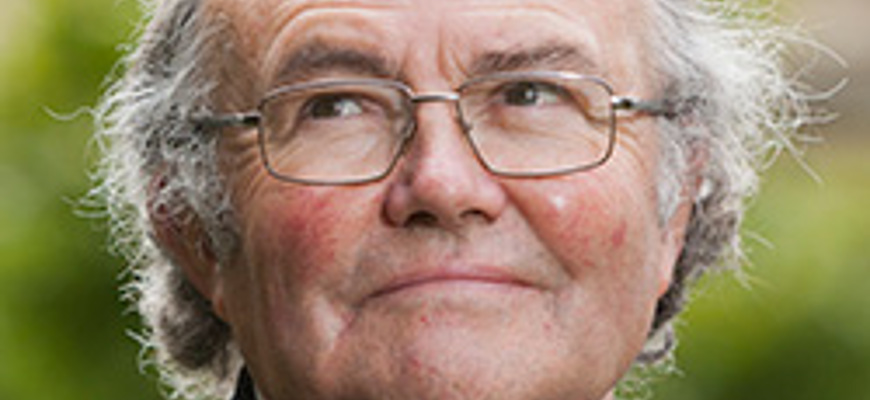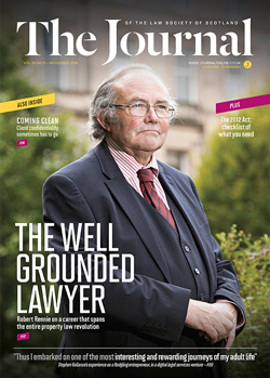A tale of two systems

There can be few lawyers who so completely bridge the gap between practice "then"and "now" as Robert Rennie.
Conveyancing practice in 1969, the year he qualified, was another world from that which faces today’s new lawyers. It was a world before standard securities (never mind the CML Handbook), a world before registration of title, a world of feuduties, noting of title, and all deeds having to be executed on every page. Now, as he retires as Professor of Conveyancing at the University of Glasgow, the feudal system has been swept away, Registers of Scotland has been tasked with completing the Land Register within 10 years, and fully electronic contracts and processes for the sale and transfer of land are about to become a reality. Indeed the very subject of conveyancing barely exists today as an academic discipline.
"There is very little left of the practice I first knew", Rennie agrees, when I ask if anything of it has survived. "In many ways judgment has given way to protecting your back. Certainly when I started in practice, there would have been hardly any negligence claims against solicitors, or indeed any profession. And that allowed professionals to exercise judgments without worrying about the outcome. Nowadays, a lot of time in the professions is taken covering your back by confirming things in writing, pointing out risks all over the place."
Is that just the way of the world, I wonder? Rennie accepts that it isn’t so much down to the changes in legislation, "though legislation tends to be very much consumer oriented, consumer protection, remedies for consumers". Rather, "I think that as much as anything else it is the march of progress, and the need for clients in particular to be given as much protection as possible"- one consequence being an end to the halcyon days of a missive offer for a house containing a mere 10 or so clauses, and likely attracting an unqualified acceptance.
"Suddenly people looked for more protection: there must be a central heating system that works; there have to be building warrants, completion certificates for alterations; we don’t want there to be any risks about a development three fields away; and once lawyers put these things in, they become the norm, they become the standard of ordinary practice and therefore the negligence test."
Not only are there now set formats, checklists, boxes to tick: another feature of modern practice is highly relevant to professionals’ liability. "You must also bear in mind that instructions very often come in contractual form, especially from lenders. The CML Handbook has undoubtedly brought about considerable changes in practice, and it has to be borne in mind that contractual instructions do not in any way need to reflect an ordinary standard - they may reflect far higher standards, and often do."
From the high street
Rennie could never be accused of being remote from the concerns of ordinary solicitors: a novel feature of his appointment as Professor of Conveyancing, in 1993, was that he came from a high street, non-city, general practice background. Even so, he was the first incumbent to be appointed by the university direct, rather than put forward by the Royal Faculty of Procurators in Glasgow, as his eight predecessors had been. "I was for 30 years in what would be regarded as a largish firm in Lanarkshire – Ballantyne & Copland,"he relates, "and the story of that firm reflects in many ways what has happened to legal firms in general.
"When I began in practice many towns, Paisley, Hamilton, Motherwell, Perth and the like, had a clutch of what would then have been regarded as small to medium firms, maybe five partners who gave a good all-round service to the public, covering conveyancing, wills, matrimonial litigation and crime. In those days a large city firm might have had 12 partners. The situation now of course is that many high street firms have two or three partners. [In Harper Macleod, where he moved in 2002] I have 58 partners. And the firm is departmentalised. I would certainly not think now of trying to do a corporate takeover, or a divorce, nor would somebody in the corporate department think of doing any sort of conveyancing."
What was it that attracted him to the university post? "I had been on the Law Society of Scotland's Conveyancing Committee for a number of years, and had also been the convener for some time. While I was on that committee [Professor, later Sheriff] Douglas Cusine and I had written a book on missives. Shortly after that the chair became vacant at Glasgow, and so a number of things came together that made it an opportune time to apply."
Does he find his teaching work an advantage? "Yes. You benefit in two ways. First, from working with young people. That has been a great privilege. They keep you young, at least in mind; they keep you fresh; and they keep your feet on the floor. They don’t let you get over-pompous. Secondly, you have to keep up with the law in which you practise, because you have to teach up-to-date law."
Law, not practice
Some years ago, Rennie reflected he was the last remaining person at a Scottish university to hold the title Professor of Conveyancing (Journal, November 2013, 15). What he actually taught also changed radically over the years. No more the 9am conveyancing class that more senior lawyers will recall; latterly he gave two classes of his own devising, one on commercial missives and one on professional negligence (covering the professions generally).
"Conveyancing as a discrete subject probably no longer exists", he observes. "It always did bring together elements of contract law, property law, succession law, security law. It was the law relating to deeds. With the advent of land registration, however, once a title is registered, the deeds don’t matter. Land registration law takes over to a large extent from conveyancing. Missives and disputes relating to missives are a branch of contract law, the law of obligations, so the various parts that made up conveyancing have largely been dispersed" – to courses on property law, obligations, and to the Diploma.
I wonder whether Rennie thinks that the study of property law has become simpler since the reforming Acts. He pauses before responding. "That's quite a difficult question to answer. I suspect more difficult, but I think that has nothing to do with the Acts themselves, but the fact that so much of the law before the Acts was actually practice. It's no surprise that the main textbook, Halliday, is called Conveyancing Law and Practice. So when I was an apprentice, in Professor Halliday's firm as it happens, the partner who supervised me would say, ‘There are certain things in a title I will accept; there are certain things I won't accept.' That wasn't because s 357 of a certain Act said such and such; it was an exercise of judgment about what was acceptable or not.
"Nowadays lawyers do not take these risks. They tell clients, for example, that the right of access is not in the deeds, but may have been constituted by 20 years' usage. They send the client photographs and copy affidavits and say, ‘It's up to you.' The client might say, 'But surely this is your job?' To which you would reply, 'There are risks. Somebody else might not accept it when you sell.’
"What applies to the study of property law applies equally to the practice of property law. It is more difficult because there is now a statutory regime where there was previously an exercise of judgment. There is also policy and practice at the Land Register, and the practice of second guessing the Keeper, especially on first registrations obviously. If the Keeper won't accept it, won't put it in the property section, why should I accept it?"
Lasting influence
Whether or not the law is any simpler, Rennie himself has had some influence on the shape it has taken, and it is this that he headlines when asked what have been the highlights of his university career. "I think seeing statutes come to life where I've been involved either as professor or as a member of the advisory committee to the Scottish Law Commission in the actual framing of the legislation." Starting with the Requirements of Writing Act 1995, through the feudal abolition legislation in 2000, the Title Conditions Act 2003, Tenements Act 2004, Long Leases Act 2012, and the Land Registration Act 2012, he has, you might say, been at the heart of the action.
He is not yet cutting all ties with academia. Some teaching will continue, as will his prolific writing. "I have to write a completely new title for the Stair Memorial Encyclopedia on conveyancing. It’s because I did the last reissue! Also a SULI [Scottish Universities Law Institute] work on leases - the manuscript has been submitted, thank God."
Nor is he ready to quit as a partner in Harper Macleod, or from his opinion work. So the man who set out in practice the year before the first feudal reform Act will complete the journey with the rest of the profession into the full electronic conveyancing age - though asked if it holds any terrors, he is forced to admit: "I have people who do these things for me!"
We might forgive him that much help. Robert Rennie is held in high enough regard that a Festschrift in his honour is being prepared for publication next May. Further honoured with the title Emeritus Professor, and the status of Honorary Fellow in recognition of his contribution to the School of Law and the Senate Office, Rennie claims to have been "absolutely astounded"when he heard. "It's normally something which you would give for a pure academic, as opposed to someone like myself who practises as well. I'm very touched by it and also by the people who have agreed to contribute essays."
In this issue
- Age before duty
- Title to tissue
- Standing the test of time?
- Adjudication: a risk of abuse?
- Courts in all but name
- When is a person a “relevant person”?
- Reading for pleasure
- Opinion: John Scott QC
- Book reviews
- Profile
- President's column
- People on the move
- The designated day is here
- A tale of two systems
- LBTT: the rules and rates emerge
- The price of probity
- Play to your strengths
- Into the unknown
- A changing landscape
- Get the basics right
- Holiday pay: give us a break
- Money into thin air?
- Pathways to justice
- Flesh on the bones
- Scottish Solicitors Discipline Tribunal
- Streams of thought
- Over the finishing line
- Over the finishing line (full version)
- Law reform roundup
- The path less travelled
- The right kind of risk
- Frauds and scams – increasing awareness
- Ask Ash
- The process engineer's tale
- To disclose or not to disclose?






